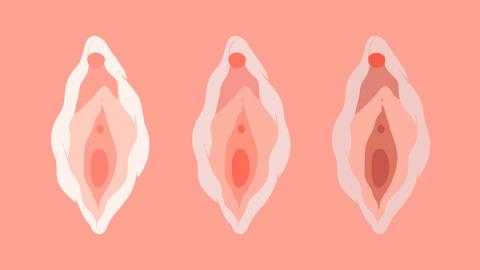Postpartum thyroiditis: Causes, diagnosis and treatment

Postpartum thyroiditis is an uncommon but dangerous condition. Doctor Nguyen Van Huan's article will tell more about this disease.
Postpartum thyroiditis occurs in people with previously normal thyroid function, whose thyroid becomes inflamed during the first year after the birth of a baby. This is an uncommon disease. For more basic information about this disease, SignsSymptomsList would like to send you the following article.
content
1) Overview of Postpartum Thyroiditis
The thyroid is a butterfly-shaped organ located in your neck.
Postpartum thyroiditis usually lasts a few weeks to a few months. But, postpartum thyroiditis can be difficult to recognize because its symptoms are often mistaken for the stress of having a baby and postpartum mood disorder.
For most women with postpartum thyroiditis, thyroid function returns to normal within 12 to 18 months of the onset of symptoms. But there are some cases that progress to permanent complications.

Thyroid
2) Symptoms of the disease
When you have postpartum thyroiditis, you will go through two stages. Inflammation and release of thyroid hormone occur first. This causes signs and symptoms similar to those of hyperthyroidism, including:
These signs and symptoms usually appear one to four months postpartum and last one to three months.
Then, as thyroid cells become depleted, signs and symptoms of hypothyroidism appear, including:
Symptoms usually begin 4 to 6 weeks after the symptoms of hyperthyroidism go away. And they can last from 6 to 12 months.
However, keep in mind that some women with postpartum thyroiditis only have symptoms of hyperthyroidism or hypothyroidism.
3) What causes postpartum thyroiditis?
To date, the exact cause of postpartum thyroiditis is unknown. However, patients with postpartum thyroiditis often have high levels of antithyroid antibodies during early pregnancy and after delivery. Therefore, it is believed that women who develop postpartum thyroiditis are more likely to have pre-existing autoimmune thyroid disease. And the disease flared up after childbirth due to changes in immune function. Essentially, this condition sounds very similar to Hashimoto's thyroiditis.
4) Risk factors
The following factors increase the risk of postpartum thyroiditis, including:
Some studies have also shown a link between postpartum thyroiditis and postpartum depression, but more research is needed. Therefore, if you have postpartum depression, your doctor will likely check your thyroid function.
5) What complications does postpartum thyroiditis cause?
For most patients with postpartum thyroiditis, thyroid function returns to normal – usually within 12 to 18 months of the onset of symptoms. However, there are still some patients who do not recover from hypothyroidism. As a result, the disease will progress to hypothyroidism. This is a condition in which the thyroid gland does not produce enough of these important hormones.
6) How to prevent getting sick?
Unfortunately, there is still no way to prevent this disease. However, there are steps you can take to take care of yourself after giving birth. If you have any unusual signs or symptoms after giving birth, don't assume they are related to the stress of having a baby. If you're at risk for postpartum thyroiditis, talk to your doctor to monitor your health.
7) Diagnosis of postpartum thyroiditis
If you have signs and symptoms of postpartum thyroiditis, your doctor will check to see how your thyroid is working. They may use blood tests to measure thyroid-stimulating hormone (TSH) and thyroid hormone levels.
If you're at risk for postpartum thyroiditis, your doctor will likely check your thyroid function three and six months after giving birth.
If the thyroid test results are abnormal, your doctor will order a repeat test within one to two weeks.
Also, if you have postpartum thyroiditis, your doctor will check your thyroid function every year to see if you have hypothyroidism.
8) Treatment of postpartum thyroiditis
Most patients do not need treatment at any stage. However, your doctor will monitor your thyroid function periodically. This will help them monitor whether the disease is going away on its own or is progressing to hypothyroidism.
In case of severe symptoms of hyperthyroidism, your doctor will prescribe some medications for you. These drugs block the effects of hormones on the body (such as beta-blockers). Beta-blockers are not generally recommended for women who are breastfeeding. However, the beta-blocker propranolol (Inderal) may be recommended. Because the concentration of this drug in breast milk is not as high as other types of beta blockers.
In the case of severe symptoms of hypothyroidism, you may need to take hormone therapy for 6 to 12 months. This method uses synthetic thyroid hormones every day. They may be: Levothyroxine (Levo-T, Synthroid).
When you stop taking the medicine, your doctor will continue to monitor the progress of your hypothyroidism. You may need blood tests after 6 weeks and 3 months. And if your test results are still normal, you'll have the blood test repeated every year.
Through the above article, SignsSymptomsList wishes to send you useful information about postpartum thyroiditis . If there are unusual symptoms, don't take them lightly and assume it's just stress. See your doctor through the SignsSymptomsList appointment system to find out the cause and make a diagnosis.
>> See more:
Postpartum thyroiditis is an uncommon but dangerous condition. Doctor Nguyen Van Huan's article will tell more about this disease.
Menstrual disorders after childbirth, what should be done is a matter of concern for many people, especially those who are new mothers for the first time.
Doctor Nguyen Thanh Xuan's article about vaginal changes after giving birth causes many questions and worries for women.

